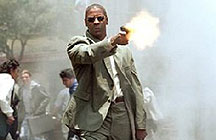|
|
|
|
Man
on Fire
|
 |
|
In a gruesome scene, John, our anti-hero bent on righteous revenge, sits in the front seat of a car and tortures information out of a prominent crime-world figure. Every time John does not get the answer he wants to hear, he cuts another finger off the tied hands of his captive. There are two strikingly subversive things about this typical moment in the relentlessly sadistic Man on Fire. Firstly, the violent anti-hero is played by Denzel Washington, whose box-office status is normally tied to his unimpeachable moral value. Secondly, to complement director Tony Scott's jazzily fractured images, the soundtrack merrily distorts and massacres a trio of easy-listening standards: Linda Ronstadt's "Blue Bayou", Santana's "Oye Como Va" and Toni Basil's "Mickey". Even Quentin Tarantino's transgressions against middlebrow taste never went quite this far. Man on Fire is a bizarre spectacle, and the strangest high-budget film to come out of Hollywood since Bad Boys II (2003). It takes a staple of B grade cinema – the avenging hero whose obsessive pursuit of the bad guys comes close to turning him into a figure of comparable evil – and then muddies it beyond all recognition. John is an ex-CIA operative who has seen better days. Early scenes with his old pal Rayburn (Christopher Walken) in Mexico strongly suggest that these men have spent the better part of their adult lives in pursuit of money, sex and murderous thrills, under the guise of various dubious political agendas. But, in instant contradiction of all this – and everything in this movie proceeds via flagrant contradiction – we then see John as a fundamentally good man seeking redemption, and Rayburn as his benevolent brother-figure. John picks up his old profession as bodyguard for the family unit of Samuel (Marc Anthony), Lisa (Radha Mitchell) and little Pita (Dakota Fanning). The unceasing dark looks on the husband's face, intercut with the wife's eagerness to placate him by stripping off her shirt, point to a serious malaise in this household. And then there's Pita, seemingly wise, sophisticated and inquisitive beyond her years – and pining so hard for a sympathetic friend of the kind that gruff John refuses to be. Naturally, a big event occurs to turn all of this around, or bring to the surface the worst that has been hitherto suggested. The supposedly topical element in Man on Fire is the studied attention it pays to the prevalence of kidnapping in contemporary Mexico. On the level of depicting this supposedly savage, underdeveloped culture, the film exploits an undercurrent of middle-American racist hysteria unseen on screen since the unlovely era of Midnight Express (1978). The weirdest index of this unpleasant attitude is the film's hyper-dramatic subtitling of non-English dialogue: menacing, monosyllabic words enlarge and drift across the screen like teletype messages from Hell itself. Scott is a filmmaker who likes to exaggerate everything. The sentimental scenes are super-treacly, apparently in an effort to balance out the sadism which the film metes out with relish every time that John gets a villain in his grasp (a scene in which he places an explosive device up a gangster's backside is mind-bogglingly grotesque). Man on Fire is shamelessly manipulative of its audience's emotions, especially in relation to how it uses and abuses Pita. But it is also wildly out of control – resulting in a pop culture event that is horrible but undeniably fascinating and revealing in its excess. MORE Scott: Crimson Tide, Domino, The Fan, True Romance © Adrian Martin August 2004 |
![]()